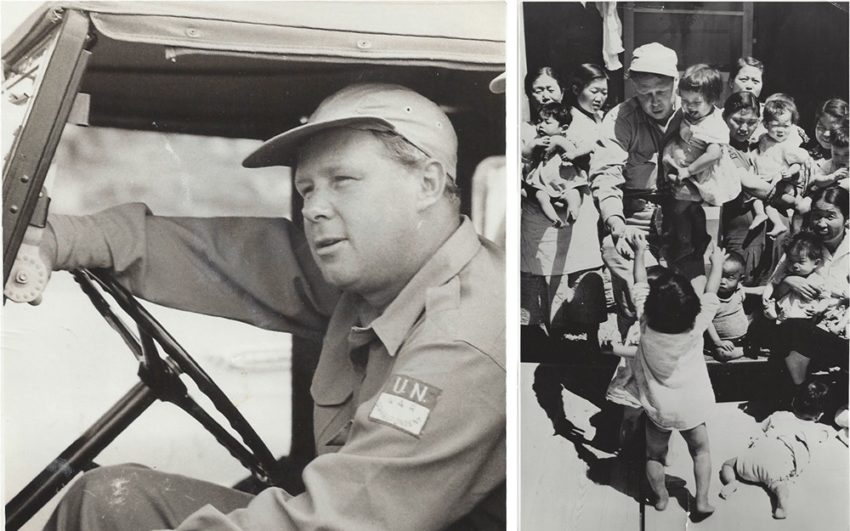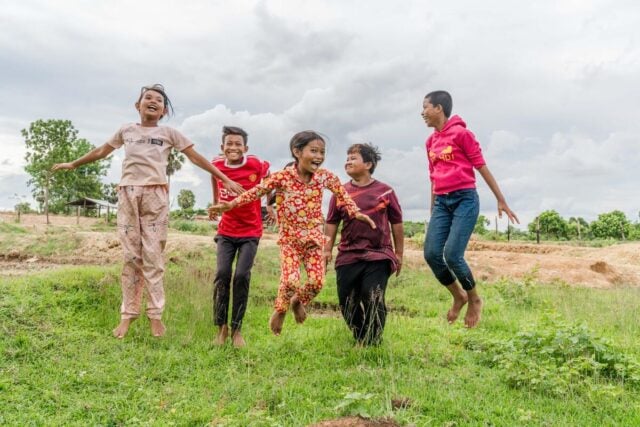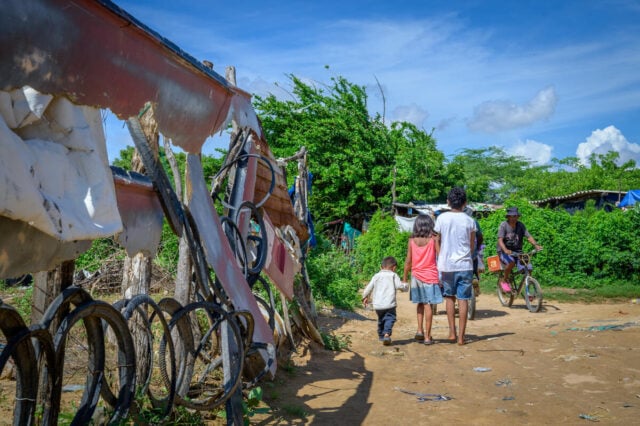As Christmas approaches, I thought it would be fun to share some excerpts from my father’s Christmas radio messages. From 1957 until 1962 my father, World Vision founder Bob Pierce, recorded 306 weekly programs that were broadcast into millions of homes across the U.S. and Canada on ABC radio. This was my father’s way of talking directly to the people who supported World Vision in its early years.
Every week his stories transported listeners to another remote part of the world to “see” the needs that were “breaking the heart of God.” He also introduced them to missionaries and Christian workers who were meeting those needs in extraordinary ways, often with little more than their hearts and their hands.
I have previously told the story of one of those people — American missionary Tena Holkeboer. She challenged Dad to “do something” about the need of a Chinese girl named White Jade.
During the broadcast excerpted below, which originally aired on December 22, 1957, Dad tells the story of the first orphanage. The story takes place in 1952, and he was in Korea as a war correspondent for a Christian news outlet. World Vision had been founded in 1950 as a fundraising channel to meet the emergency needs of Korean refugees and widows.
Let us who are Christians — every one of us — purpose in our hearts this Christmas that even if we can’t do everything, we’ll do something!—Bob Pierce
I must add that the “special guest” Dad introduces at the end of the program was an unexpected surprise!
The first orphanage
Last week I told you about Tena Holkeboer, the missionary to China who introduced me to White Jade and first opened my eyes to the needs of little children without a Savior. Today I want to tell you about another amazing woman God used to open my eyes to need. It was Christmastime, 1952, and the fighting in Korea was still raging. A missionary named Mrs. Ross grabbed my arm one day and said, “Mr. Pierce, I don’t care what else you’re doing! You must come to see one of the greatest needs I’ve ever looked on!”
She took me across the city of Taigu, which was jammed with refugees, and through the snow and the cold to a flimsy house that had been abandoned by the Japanese when they left Korea. There we found one Korean woman and four teenage girls. Together they were caring for over 120 tiny babies whose mothers had died. Some had died just hours before.
Some babies had been brought to the house by American GIs and Korean police. Others had been brought by folks who had heard that there was one woman in that city jammed with refugees who, forgetting herself, had opened the doors of her house and would accept these helpless little bits of human wreckage caught in the midst of that awful tragedy of war.
At first I heaved a sigh of relief that these babies were being cared for. Then I saw how they were cared for! As I wandered around it dawned on me that all the babies were crammed into one or two rooms and just laying on the floors. And I said, “Why aren’t these babies spread out in this big house?”
“Because we only have fuel to heat this one big room and one other,” the woman answered.
“But they don’t have diapers on,” I said, looking at the tiny babies with a few rags lying between their little loins. And the woman said, “That’s because we don’t have one diaper!”
She took me to a window and pointed out and there were ropes strung on the outside of this Japanese house and washed rags hanging pinned to the ropes, frozen from the cold.
I looked at the babies and said, “These babies are half starved. What in the world are you feeding them?” And she said, “We haven’t had any milk for several days. We’re giving them rice water.”
And I said, “Well, they’ll die.”
“Yes,” the woman answered. “Last month 40% of our babies died.”
I thought of how scandalized the various agencies of Earth would be to think of any baby home that would let 40% of the babies die.
Then it dawned on me that nobody else was doing anything. This Korean woman wasn’t a doctor or a nurse, and all she had was a cold Japanese house. But there she was with two heated rooms, doing what she could.
That’s the first time I [World Vision] ever took a whole orphanage on. But it wasn’t the last.
This Christmas there are places all over the world where there are desperate needs such as this! And there are people, like that woman in Korea, who are trying to do something. But they need our help.
Dear friend, wherever you’re listening. The world is being lost to [those who] promise to do something!
Let us who are Christians — every one of us — purpose in our hearts this Christmas that even if we can’t do everything, we’ll do something! Something to still the cry of starving babies; something to ease the pain of heartbroken, crushed women in portions of the world where womanhood is still debased and deprived of almost all human rights. Let’s do something for the mass of orphans, lepers, and suffering ones in the world, and begin this Christmastime by remembering those who have nothing, while we have so much.
Remember them in your prayers. Think of them as you count your own blessings around the Christmas tree on Christmas Day. And if God should lay it on your heart, write to World Vision this week with some little gift for our orphans, the babies, the lepers we’re caring for. We’d love to have your help.
A special guest
Well, time has come and gone and there’s one last blessing, one special guest with which I want us to end our program today. I have at my side my own little 7-year-old, Marilee.
We’re not together as much as a Daddy and his little girl ought to be. Sometimes we’re not together at Christmas. I guess I haven’t been with her on her birthday more than once out of her seven years. But each night when I’m home I slip into Marilee’s bedroom, and we kneel together and pray. Marilee hasn’t been overseas with her daddy yet, but she cares about the little children. She prays for her daddy, and she prays for all the orphans. And I’m going to ask her to end our program this Christmas Day by praying for the children who have no mother and daddy and for all the people all over the world who have so little, while today we’re enjoying so much:
Dear Heavenly Father, help the little orphans all around the world to get good Christian homes and to have a happier Christmas. Help more people to care about them and to take them into their hearts and to love them. And help the people around the world to help in your ministry and to tell others about You. For Jesus’ sake, Amen.
And all God’s people said, “Amen!”

Marilee Pierce Dunker travels the world as an ambassador for World Vision, the organization her father, Bob Pierce, founded in 1950. Like he did, she shares stories, pictures, and personal reflections, bearing witness to the extraordinary ways God is using his people to share the gospel and care for the poor.
Visit World Vision’s Speakers Bureau site to request Marilee or another World Vision speaker to present at your upcoming event.


